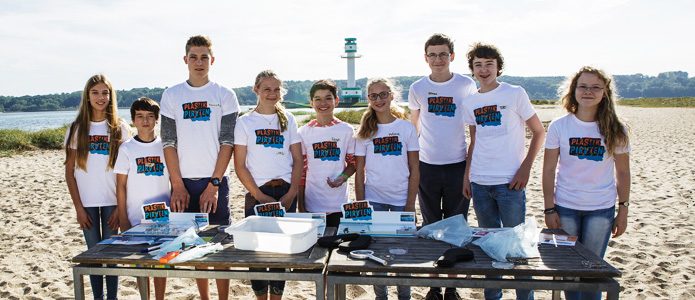Science Year 2016/17 is focusing on our seas and oceans. Within the framework of a join-in project, young people are investigating the extent to which our waterways have been contaminated by plastic waste.
Turtles whose shells are tangled in plastic threads. Dead seabirds whose stomachs have been cut open and reveal all kinds of colourful plastic particles. These are the typical images that dramatically warn about the consequences of polluting our seas. Every year up to 12.7 million tons of plastic waste end up in the sea. Almost two-thirds of the plastic waste in Europe comes from disposable packaging, the kind used in everyday life. A standard plastic drink bottle has to float around in the water for about 450 years before it decomposes.
The pollution of the oceans has serious consequences for the animal world. More than a million seabirds and around a hundred thousand other creatures die from plastic waste every year. Not to mention the still unknown consequences for humans when fish, mussels and prawns ingest microplastics. These are plastic particles less than five millimetres in size. They come from weather-beaten objects or from the cosmetics industry.
“The sea starts here!”
In order to thoroughly explore the impact of plastics on our seas, the German federal government is investing 28 million euros in a large-scale program. And the Science Year 2016/17 has also been devoted to the topic. The German Federal Ministry of Education and Research (BMBF) and the
Initiative Wissenschaft im Dialog/WiD (Science in Dialogue Initiative) launched the first Science Year project back in 2000. They are intended to promote dialogue between research and the general public on current scientific developments. Every year the focus is on a different theme and these themes are accompanied by all kinds of join-in projects. “Plastic Pirates” is one of these projects – one in which children and young people have focused on Germany’s waterways. They examined streams, rivers and riverbanks, their findings were documented on a digital map, under the slogan “The sea starts here!”
It is not just our seas and oceans that are being examined, environmentalists are now also focussing on European rivers. The tenth grade at the Volkmarode integrated comprehensive school in Braunschweig have ecology as a subject and this is what they are also concentrating on. On the initiative of their teacher, Jana Gömmer, the young people participated in the Plastic Pirates project and took a closer look at a section of the river Oker. The Oker is a 128-kilometre-long river in the state of Lower Saxony. Its waters eventually flow into the river Aller and the river Weser, so the pollution actually reaches the North Sea in a somewhat roundabout way. The students found, among other things, crown bottle caps with plastic inserts, bottles and a CD. They sent all the things they found to Kiel, along with a net that filtered microplastics for an hour from the waters of the Oker.
Research partners in Kiel and Coquimbo
The School Science Lab at the University of Kiel and the marine biology team at the Chilean University of Católica del Norte in Coquimbo are jointly analysing the Pirates’ findings. “In many places, there is still hardly any research being done on plastic waste from flowing waterways. The Plastic Pirates are helping us to close this gap,” explains marine biologist and laboratory manager, Katrin Knickmeier. “We are hoping for answers to questions such as: Which rivers in Germany are particularly polluted? In which state do the rivers have the most garbage? Are large rivers more polluted than small - and how dangerous is this plastic waste?”
The pupils are particularly motivated by the fact that they can help to develop ideas for the protection of the oceans, says teacher Jana Gömmer. “They are enthusiastic because their project has not just fizzled out and come to nothing, but actually has some real scientific benefit.” The Kiel Research Institute also teaches them how they can avoid plastic waste in their own daily lives. “It strengthens the young people’s awareness that big things in fact have small beginnings.”
